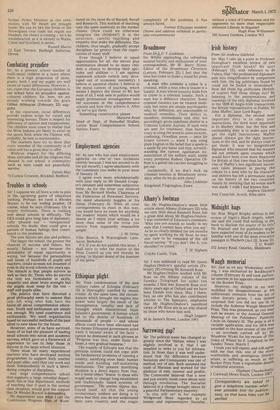Troubles in schools
Sir: I suppose we all have a role to play in the agonising game of education bashing. Perhaps we need a Rhodes 13oyson to be our wailing prophet. Of course, what he says (February 15) is largely irrefutable. There is nothing new about schools in difficulty. The DES could give long lists of diplomatically 'phased out' — 'reorganised' schools. No doubt, they could give a pattern of human failings that contributed to the problems.
The new factors are size and politics.
The larger the school, the greater the chances of success and failure, but mostly, failure — not because the philosophy of equal opportunity is wrong, but because the personalities and needs of hundreds of pupils and teachers, create stresses not dreamed of even in the worst schools ten years ago. The miracle is that people survive as well as they do. Those who do survive the test are formidable in skills, empathy and sheer brute strength but the angels must weep for the rest — staff and pupils alike.
The politics that have distorted a good philosophy seem to assume that only left wing whiz kids have the know-all about comprehensive education. Youth and enthusiasm are simply not enough. We need experience and enthusiasm. We need organisation based on successful methods of the past allied to new ideas for the future.
However, some of us have survived. Some of us had the pleasure of leading small schools into social and academic success, which gave us a framework of experience to use to help those in distress in the large school situation.
There must be many experienced teachers who have developed method programmes to support both teacher and pupil alike, until they can work and think independently in such a bewildering complex of disciplines. .
Any large comprehensive school that supports a large remedial departs ment, has in that department, methods of teaching that if used in the normal class situation, would give the support that Dr Rhodes Boyson is demanding. My department uses what I call the 'Continuous Progress Plan of Work' based on the three Rs of Record, Recall and Research. This method of teaching uses the same materials as the normal classes. (How could we otherwise integrate the children?) It is the structure, careful teaching and empathy that make the difference. The children, thus taught, gradually accept disciplines far greater than the expectations of many staff.
Even though I believe in equal opportunities for all, the eleven plus examination denied to so many children a chance to develop their aptitudes and abilities — I am against mammoth schools (which only developed out of economic necessity). I believe in parental choice. I believe in the moral content of teaching, which means I deplore the threat to RI, but most of all, I wish men in politics would begin professional investigations into the successes in the comprehensive schools and how they achieve it. After all, we've got them.
Something constructive, please.
Marjorie Reed Head of Dept. of Remedial Studies, Latten Bush Comprehensive School, Harlow, Essex.

































 Previous page
Previous page